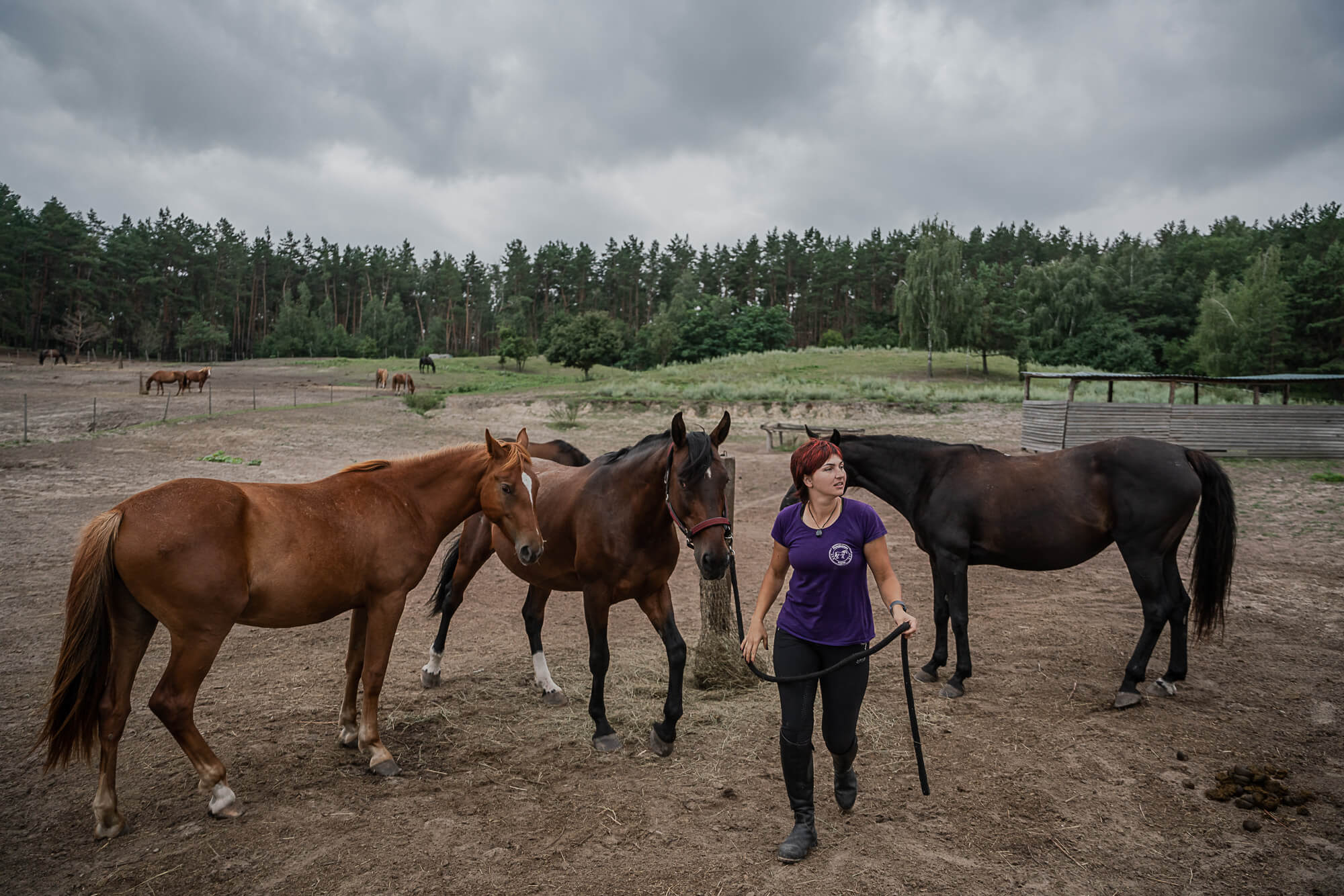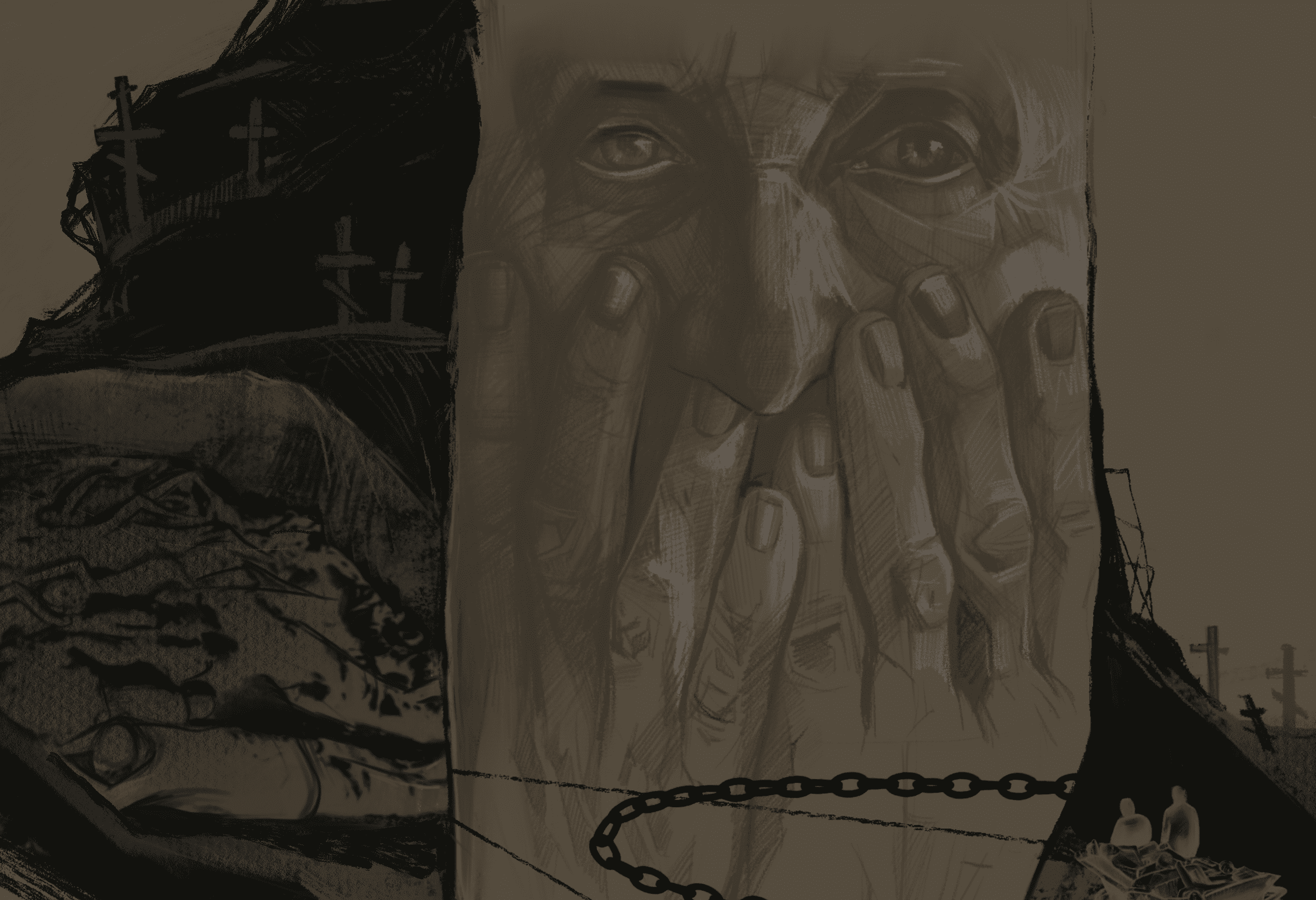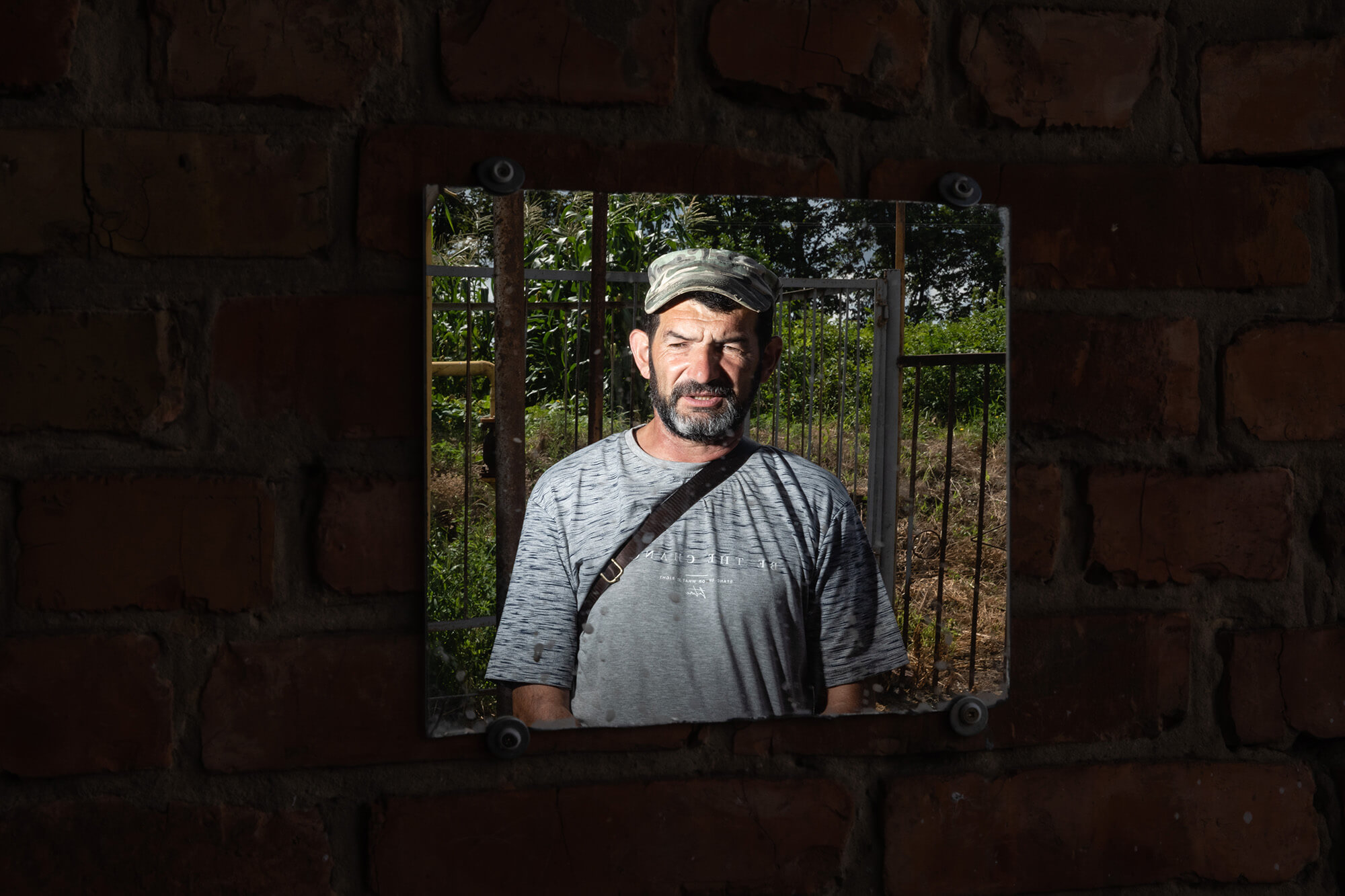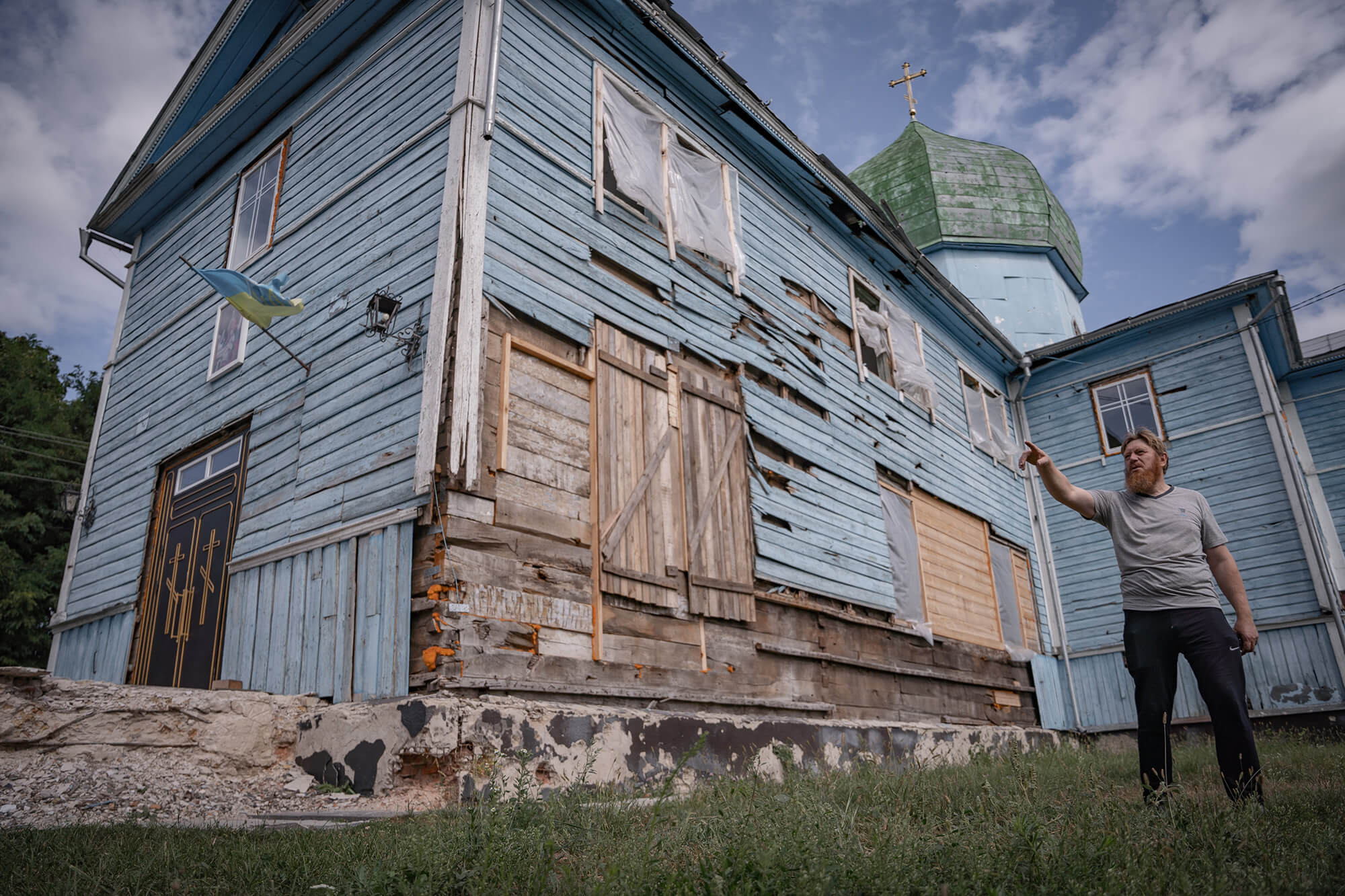
The Amber Curse
Uncle Stepan knows for sure who was the first to find amber in the village of K. in the Sarny district. “It was Pshonka and Yanukovych!” Alas, he knew nothing more. For he has never “dug for it, washed it, or even cared.” This was the peculiar local style of avoiding answering questions. However, it was quite easy to tell who was feeding me a line—a look at their houses was enough.
Here, the backyard was covered in grass, while there it was paved in cobblestone. Here, one could see a number of roofs shingled with slate, while there they were covered with metal tiles. There were houses with brand-new windows and walls only half painted, meaning the owners had missed their chance. As one of these owners loves to say, “When there’s amber—there’s money. No amber—no money.”
And there are times when there’s simply no luck.

Shatters
“Mom, I’m getting married!” Ivan shouted from the doorway. It happened right after he had gone to the Klondike for the first time. That’s what the locals called the places full of treasures in the tradition of American gold diggers.
Naturally, he was only joking about the wedding, as he was a poor physics student at a university in the capital then. It’s just that when you come home for the weekend and manage to make a couple hundred or even a thousand bucks in a single day with a shovel, your emotions might let you get carried away.
It was 2013. Those blessed times when “a dollar cost 8 hryvnias.”
“Who’s gots a car? Let’s go dig tomorrow!”
It was just Ivan and a couple of friends inside the truck. They threw shovels inside, picked up some food for the day, and left their village of Varash headed toward the village of Volodymyrets. They would test their luck there working from dawn until the sun sets over the horizon digging out a lengthy pit.
Inspired by the legends he had heard before, Ivan expected a great bit of success from his first trip: “I’ll show up and dig up everything!”

But that’s not what happened. Excited, Ivan jumped to the bottom of the newly dug pits each time he thought the sound of the shovel striking the ground was “off.” He raked through the earth with his hands imagining immense layers of amber. He smiled bitterly when he held up a lousy piece weighing about five grams.
Mice
Sometimes they needed to dig really deep, up to eight meters depending on the terrain. At a depth of three to four meters, the walls started filling in. One person stood above, while someone else dug below where the groundwater was already seeping up. It was dark and wet with only the glow of their headlamps to guide them. Ivan got lucky, for he was only lightly buried in dirt a couple of times. But, there are plenty of tragic stories. Ivan has heard that some people have even been paralyzed after having getting buried.
Due to a lack of modern technologies, the diggers sometimes have to shore up the ground with tree trunks—a poor guarantee of safety. For instance, a lot of forest went to this in the town of Olevsk in the Zhytomyr region, the former amber capital. The pits there were probably the deepest. Witnesses say they looked like garages with basements. People would lower themselves down on ropes. In the blink of an eye, a wall could collapse, and all one could hear was a squeak. Just like a mouse.
Despite the danger, there are always plenty of kids at the Klondike. There are some with shovels and others who are still learning. The latter have an advantage: when the pit is ready, they lower the kids to the bottom and let them take their time rummaging around. This is a game for the kids. Sometimes they even find real treasures! Ivan laughs at them, “They should be called rummagers instead of diggers.”
Due to a lack of modern technologies, the diggers sometimes have to shore up the ground with tree trunks—a poor guarantee of safety. For instance, a lot of forest went to this in the town of Olevsk in the Zhytomyr region, the former amber capital. The pits there were probably the deepest. Witnesses say they looked like garages with basements
However, the really big money is not mined with shovels, but with pumps that sound like jet planes.
To work with a pump, you need a body of water and at least five people. There is a scheme: several hoses are connected into a single one that can be up to a kilometer long. This is then secured to a big metal pipe that’s connected to another, thicker pipe. It is called a “schreiber” and the hose is secured to it. When the pump is on, it sucks water up from the ditch and sends it through the hose in a powerful stream. The schreiber, with its toothy edge, should already be in the ground. One person holds the turgid hose, and another lowers the metal pipe with the schreiber. The ground beneath it is eroded at reckless speed. Extension pipes called “wands” are promptly screwed on the pipe, each of them two meters long. These wants let the schreiber go deeper underground.
“Amber is lighter than water,” Ivan explains. “So when the water stirs up the ground, the amber breaks the surface. Sometimes by the kilogram!”
The water from the hose washes the ground around it away. The turbid flow mixes with ground and bursts forth in a small fountain. It is low, but a trained eye can see the bright, honey-colored stones in the glow of flashlights. They say amber is the brightest mineral. And when it is polished, it even glows.
Just like people’s eyes here. During the first days of amber fever the mere sight of this small fountain made eyes shine more brightly than flashlights. People were crazy for catching or, as they call it, washing, the stones with nets as if hunting for giant butterflies. It has to be done as fast as possible; if the ditch runs out of water or the engine goes haywire, the amber instantly sinks down, and there’s no getting the hose out of the ground.
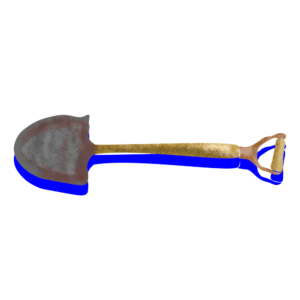
At this moment, neighboring diggers better not have any thoughts of grabbing a stone for themselves or even approaching the fountain.
“No, no, this could even lead to a shoot-out. Nobody shares the amber they’re washing,” Ivan gets serious.
The Smell of a Swamp
Oleksa and guys from the village of K. were searching for amber deposits in “corks”—gray, silty pits left behind the schreibers. When there are lots of corks in one place, you feel like you’ve landed on the Moon.
“Ah, it’s like a swamp. Do you smell it?” Oleksa says while looking around. He promptly examines cork after cork and points out place where he found his first handful of crushed amber back in 2013.
“How did we feel then? We celebrated with some ‘moonshine’!” the man bursts out laughing.
That was how he ended his 15 years of laboring in Moscow. Oleksa settled at home, just like many other people from the village. The thousand of dollars he was earning a month in Russia could now land in his pocket daily.
“Have I ever held a million in my hands? Yeah, surely when we had kupons!” Oleksa jokes. “The most I’ve ever held is 58 thousand dollars. Plus, another 50, and then another 50… Oh, what difference does it make?”
Rich are they who have a pump—not everyone can allow themselves such a purchase (they start at one thousand dollars). The rest join the team. They won’t earn much from the stones, but can still consistently get 500–600 hryvnias daily. For a village where even for the most prestigious factory job pays 7 to 10 thousands a month, employment like this is a fantastic success.
Besides, you can always get yours later. There is plenty of crushed amber too small for the big-time diggers left in the fresh swamps after the pumps. People here call getting it “diving.”
What the Cops Could Do
People in the Klondike always knew when the police came around. “Cuckoos” stood watch on the ways in and out of the village and would call each other, eventually reaching the diggers, if anything cropped up.
Later on they got walkie-talkie sets. “We had such good communication Facebook would have been envious!” Ivan says. In an hour or two, the entire village bent over backwards. Waiting for squad cars.”
Sometimes policemen came with machine guns. They would shoot into the air, trying to get attention. “But what did people care? Take one squad car: it has maybe ten guys, but we have a thousand. Take two squad cars. It’s twenty of them versus two thousands of us. When you’ve got the whole crowd of people, it’s unrealistic they’ll catch you.”
Ivan reckons that that many people could dig up an entire forest in a day. The police knew who was going where and when. But all they could do was chase folks from one place to another. They would flee and come back an hour later. Some of them were armed, just in case.
Ivan laughs recalling when the police first arrived and shouted that it was all illegal. But just a minute later they were secretly taking shovels and pumps themselves.
Sometimes policemen came with machine guns. They would shoot into the air, trying to get attention. “But what did people care? Take one squad car: it has maybe ten guys, but we have a thousand. Take two squad cars. It’s twenty of them versus two thousands of us. When you’ve got the whole crowd of people, it’s unrealistic they’ll catch you.”
Later on they started taking their profit on the front end—200–300 bucks from each pump for “permission” to work. The cops dealt with diggers honorably—working with shovels was free.
After a while, they ended up setting up a strict work schedule. “It was like, guys, you’ve paid, so no one will bother you. At other times, though, we will come, do, and take whatever we wish,” Ivan explains.

And they indeed did take everything: pumps, amber, and everything else. They couldn’t start legal proceedings, so they would wash stones themselves.
“It was the SWAT team that we feared the most. This meant the circle of influence reached all the way to members of parliament.”
Provocations
“We washed a lot. We were washing, paying, and running for our lives,” Oleksa tells me. The villagers say that the best times were when they lived without a president—in other words, winter and spring 2014 when Oleksandr Turchynov was the acting president. Little by little, this warm spell brought mercenaries and other strangers to the Klondike.
On May 9, they set some machinery on fire.
“We went to ‘our’ territory in the woods and our gennie was on fire. Then we saw the intruders sitting right beside it,” Oleksa tells about losing the generator which was often used as a mini-pump. The guys started getting rid of the intruders. Nobody knows how they persuaded them, but eventually the mercenaries got the message and started to go.
Indeed, they began leaving through another part of the woods where some other local folks were driving. One took a bullet to the shoulder, another got his hand cut, and a third’s phone was pierced by a bullet.
Neighboring villages started making a fuss—no one had ever dared behave that blatantly in the woods.
Rakes, sticks, nets, guns—men and women grabbed everything they could find and dashed off to defend their earnings. “Meanwhile, the intruders went to the lake. We followed. Approaching the bridge, we saw they’d parked their Benzes there and were coming at us with pistols and machine guns.”
The police arrived. From the video, it is quite obvious they barely had the situation under control: a noisy crowd of a thousand on one side, and a silent gang with machine guns on the other.
Oleksa is sure that on that day the villagers were setting the deputies’ cars on fire. And even though their license plates bore the Russian tricolor and they found Right Sector leaflets inside, no one here believes in provocations.
What Are We, Stupid?
Everything went quiet. Yet everyone knew those on the top would hardly stop. This set off fourteen days of what villagers from K. call “mayhem.” In other words, a crazy period of searching for amber.
“People worked day and night—24 hours. We only had one pump, and the teams just changed shifts. Some people didn’t work ‘round the clock and really regretted it later!” says Larysa from the village of K. This forceful woman started working as a digger, and later became a link in the chain of stone dealers.
People rushed and didn’t have enough working hands. Over those fourteen days, Oleksa paid his guys not 500–600 hryvnias, but 300–400 dollars. And then they came up with an honorable plan—to improve not only their families’ welfare but also the entire village’s.

“What are we, stupid? People needed their share as well. Some people were making money, while others remained poor,” he explains. With others he installed a gate at the entrance to the woods. Teams with pumps passed through it one after another. Oleksa collected money:
“Where are you from?”
“Kostopol.”
“I don’t give a damn, actually! Give me 300 bucks and off to the woods.”
“And you? Rokytne, you say? 300 bucks to get in.”
“Oh, one of ours! Just get in there fast.”
Oleksa believes dividing people into “ours” and “theirs” was the right thing: “They are making money off our land!”
Everybody paid, nobody argued. When asked if people could have complained about such tyranny, Oleksa and a couple of women and men around him burst out laughing: “What, would they have called the police?”
In two weeks the diggers collected enough money to build a dispensary in the village, install 25 plastic windows in the local school, patch up a stretch of road, and send 9 thousand bucks to help soldiers in the ATO. “We spent thousands to help people!” Oleksa shouts. “Somebody got sick, somebody else needed an operation, someone else had other problems.”
However, the idyll couldn’t last forever. Whereas initially the villagers agreed to start work simultaneously, later on they began trying to outwit each other.
“Teams from the entire neighborhood washed amber together. And then people started wanting more, someone else wanted to rat on them, and envy sprang up. God forbid someone else washes more!” Larysa says. “I remember Sashko even cut their hoses when people started working at 8:30 am instead of 9:00 am! That wasn’t fair.”
That’s how the community fell apart.
“And now our people have to pay for their own land,” a girl from the village of K. sighs.
The Red Glove Squad
“Do you see that fence? The gangsters live behind it,” the villagers converse in whispers. Each yard used to be visible behind its flimsy wicket gates, but now everybody was hurrying to hide them. It had been a year since these dubious new homes of the “intruders” had started appearing in the village. Even their windows were concealed by high fences.
I was being prepared for a trip to the Klondike. The work starts in the early dusk.
“Do you really want to go in these boots?” Our guide, Denys, bursts out laughing. “We’re going to swamps. Sometimes even my tall boots aren’t enough. I’ve fallen in to my neck, even once past my head!”
Denys lends me rubber boots and gloves, a jacket, a headlamp, and a large net with a wooden handle about two meters long. The tool is heavy and extremely unwieldy for a short person.
We take bumpy roads to the woods. The forest greets us in a friendly manner, with the sound of a firework exploding somewhere in its depths. “This means some jerk got too close to someone else’s pump. It happens often,” my guide explains.
The woods are not overcrowded on Saturday. Whereas on workdays one can see around 70 pumps working here, on weekends there are no more than 40 of them. I can’t hear them yet. Tons of trash cover the meadows. Tin cans, wrappers, water bottles. This isn’t shocking: the locals often litter both in the fields and near their own houses.
Fire sparkles to the right. Three men are bending over a campfire next to a trailer. Corks are visible alongside them. “The National Guard. They have been sent here to guard the woods, to prevent people like us from coming here,” Denys explains without lowering his voice.
In a moment, the dark thicket gets flooded with honey-colored light. About three dozen people come out of nowhere, their feet sinking in the mud. Ultraviolet flashlights flicker in the darkness; they’re better at distinguishing stones. The air buzzes. The trees stand leafless, trunks lie knocked over beside them with narrow streams flowing between. People wearing red gloves—the team that works for the “gangsters”—are taking their pump to another place.
“Is there nothing left to wash here?” I wonder. “Not if there are still some trees left,” Denys gets serious, as if he is a professional ranger. “They just want to get under the ground from a different angle.”
Farther on, people are putting their nets into the water. “Go ahead, try it,” he encourages me.
From the very start, I realize this is not for me. The net is heavy, the water is syrupy. You push it down and then can barely get it out. Eventually, you pull out a heap of mud. Then you need to flip it to the ground without getting caught in the net. You have to filter through the mud with your fingers in search for a stone. You do this over and over. Your hands start failing you. It’s no wonder that after a year or two people here throw their backs out and have to rush around from one doctor to the next. Women can even go for a swim here in winter.
“Look, I got one,” Denys shows me a sharp, tiny stone. “This is a ‘minus,’ meaning it doesn’t even weigh two grams. It’s worth pennies. A kilo of those costs around $10–15 today.”
Denys is an old hand here; he knows the score. And though he sometimes heads into the woods with a net, he typically comes here with his team and a pump. A kilogram of washed stones weighing two grams each can be sold for about $100 USD. The starting price for ones that weigh 20 grams and up is $2,500. But people used to do even better—the price for amber has fallen two to three times since 2014. The treasure hunt is more akin to fishing now—you could just as easily go home empty handed as mine 3–4 kilos of different-sized stones.

Besides, each team now has to pay a thousand dollars to get in and give away 50% of their daily profit. There’s also a guard here. He walks around—mostly drunk—checking people to see if they’re hiding any stones. And not for nothing: Denys has gotten away with hiding a stone in his boot a couple of times. “I explained that I had slipped in and gotten my feet wet. Then I went home to change and left the hidden amber there,” he shares.
But, they are not always that lucky. People can get busted when selling stones. In this case the diggers are fined one thousand dollars, which is not open to discussion. “Sometimes I go in the red,” says Denys who feeds his family on the amber.
Suddenly, a fifth-grade boy with a net runs past us. He is obviously lucky today.
“How many times have you come here?” I ask.
“Do you think I’m counting?” the question puzzles the boy.
“What’s the most you’ve made?”
“500… dollars, of course.”
“What did you buy?”
“Boots!” the fifth-grader exclaims and vanishes behind a fallen tree.
“Don’t scare them. They aren’t used to being asked such questions. Kids are earning money for school supplies,” Denys tells. “We used to make good money on amber, and now only kids and the authorities profit.”
When the Teacher Asks
“Nowadays, every school boy or girl can make more money than their parents, if they aren’t lazy. I always let my kids go into the woods—why not? I used to be scared for my youngest son. At first, I really worried, but then it passed. Although, even now I get scared sometimes—anything can happen. When they start panicking, they might trample each other to death without even noticing!” says Larysa.
But kids themselves are scared of neither the woods nor the swamp. From the youngest age they get used to going to the forest to pick berries and sell them. A 16-year-old girl named Katia says now they check the ford with handles of the nets so they don’t drown while hunting for amber.
Just five years ago the local club was the most popular place among teenagers. Now it stands empty. “Boys don’t have time to go anywhere, they have to work,” Katia explains.
Diggers have arranged their own schedule at the Klondike: from six to six. School kids have also joined the red-glove squads. Some of them work for themselves. “You don’t have to work until the early morning,” Katia says, who also used to wash amber. Her younger brother goes to the Klondike now. “But Mom always makes sure he goes to school.”
As the girl explains, their teachers understand everything. “Our teacher told us during the lesson, ‘Go for amber, but don’t forget about attending lessons.” “She goes for it herself after all.”
Children have no incentive to learn. Whereas in 2017, the average score on standardized tests was 70.2 points (if the result was lower than the minimum, it was scored as a zero), this year it fell to 53.9. “Lately, the testing has become so complicated that it’s nearly impossible to pass,” Katia says.
She wants to get out of the village, so she studies tourism at a college in Rivne. She also wouldn’t mind studying in Poland. She explains that if anyone here longs for knowledge, it’s the girls. The boys have already made their choice—to ride brand-new motorcycles or scooters. It is typical for each teenage businessman to have two cellphones. One is “fancy” and the other is a push-button phone, so the owner doesn’t have to worry about ruining it while swimming in swamps. “Why should I waste time learning if I have a shovel?” a ninth-grade boy told a local math teacher.
“Some children are wealthier than their parents,” Denys goes on. “Some of them even support their parents by saving money. Sometimes their homes are loony bins without even a slice of bread for a meal, yet they’re riding around on motorcycles and buying whatever they want. Cell phones above all.”
Devices, motorcycles, bells and whistles—all their money goes toward these things. No one invests in education, no one strives to go abroad. The biggest trips for the local youth are to bars and restaurants in neighboring villages. Sometimes they drive drunk. Sometimes they get into accidents. “Our boys get trashed,” Oleksa sighs. “They make a fast buck and get trashed.”

Villagers are worried for their young generation. They whisper: when the amber fever was over in Olevsk in the Zhytomyr region, they switched from alcohol to drugs.
“I’ve heard they found a syringe in the school of the neighboring village,” Larysa confirms.
Out of the Picture
What will happen when there’s no more amber? The student, Ivan’s “career” lasted a year—his environmental conscience got to him. Denys is going to work in Poland. Katia isn’t against going abroad either, not just to work, though, also to study. Oleksa built a house for his children and started a business. And then he was elected to the Village Council.
“I never thought I’d be a deputy,” he says. “Inna, the council’s secretary council, called me up one day and said, ‘Oleksa, I’ve registered you. Get ready for the elections.’ I was confused—how could this be? What’s my platform? But Inna replied, ‘Relax, I’ve already written everything down: distribute this, return that. Either you are elected or not. What do you care?”
He was elected. Since 2014, Oleksa has been attending the sessions once a month. And he listens.
“Our main problem is amber. Why the hell do those intruders wash it? They all lie and say they have the authority to make decisions,” he seethes. “Do you know what the Verkhovna Rada is? That’s where all the lies begin. Why was the Rada built with a big top? Because they’re all circus freaks there. And the Village Council is the bottom level of this circus.”
Oleksa doesn’t plan on reelection, because “there’s no justice.”
It’s just that people got used to a fast, even if not easy, buck. But they’ve gotten used to having it, and I don’t know what’s going to happen next. For instance, you used to run a business, but then you stopped. But some people don’t care at all
However, he still considers himself an important person. He really does care—about the roads, for instance. “I want to repair a lot of it! They already gave us some money for this, but it’s not enough.”
He cares about security. The district police officers themselves don’t know why they’re been sent to the woods. “I tell one of them, ‘Petro, they’ve been digging the corks in your area!’ And he replies, ‘Oleksa, that’s not our area, that’s farther.”
Once he witnessed a violation on the road and called the police. “The cops are afraid! One of the big bosses told me, ‘Oleksa, as long as you have amber, we’re out of the picture.”
Locals believe they wouldn’t even investigate a murder here. They would just shake their heads.
There are lots of red flags. According to Larysa, there is no more potable water in some wells. Amber is mined deep under the ground, which affects groundwater, streams, and springs. “At this time of year it should be the other way around. It’s autumn and it rains a lot, so the ground is wet,” she explains. “I don’t remember the water in the well ever being this low.”

The village guards itself closely against prying eyes. The windows of someone who brought a journalist around were recently broken. Once they were scared by a photographer. Larysa was at work in a local store when he entered with belts hanging all over him. “I noticed that and thought he was a cop. The ‘outsiders’ instantly ran in.” She means the guys the gangsters employ to secretly patrol the streets in different cars, especially near the woods.
“What is this? What are you doing here? You got a problem?” the guards asked very carefully.
“I’m photographing kids for a school album,” the frightened man replied.
Greed Attacks
But the worst local disease is envy. “People have turned into beasts. They hate each other,” Oleksa says. “Do you know why we call envy a frog? Because it croaks, and wants and wants…”
Some neighbors even stopped saying “hello” to each other. The villagers call amber a curse against each other. But Larysa does not regret it’s appearance here. People have built houses and made good money.
“It’s just that people got used to a fast, even if not easy, buck. But they’ve gotten used to having it, and I don’t know what’s going to happen next. For instance, you used to run a business, but then you stopped. But some people don’t care at all,” Larysa tells Oleksa.
“Want a piece of advice? Build a fence as high as mine. So no one can see anything. For soon enough they’ll start breaking into houses at night and stealing,” Oleksa warns. “A fence will at least help a little.”
Larysa scoffs at him—they have already started stealing. Whereas they previously stole little things like a pot or something, now they take big stuff like motorcycles, tractors, and cars. Oleksa’s four-wheeler was stolen. Another twelve households in the village were as unlucky. “It’s an easy score—just take it and sell it,” Larysa shrugs her shoulders.
Once they found stolen things in the neighborhood—a bunch of bikes, tractors, and scooters. It was from a really wealthy household. The new owner got away with it.
Stalin Would Have Sorted Everything Out
The villagers of K. put all their hopes on the upcoming presidential elections.
“I believe things will change after the shift in power!”
“And what’ll happen? It’ll all be the same except their names!”
“There just aren’t any true patriots who could really lift the country. A patriot would make amber legal!”
“Leave amber alone. What about the woods or the fish?”
“That’s all the oligarchs. It’s their fault. They pay Poroshenko to ignore it all!”

“We need someone like that guy from the Servant of the People movie.”
“Maybe, Zelensky will win after all! What difference does it make? They will put another clown in power, but the same people will really remain in power. They just need another puppet on strings.”
“We need Lukashenko here! He’d do everything.”
“He’s greedier for power than Stalin was!”
“Stalin is exactly what we need now!”
“Stalin’s what you need?!”
“Listen, we’ve already had dictators. We’ve had it all. You know who’s really to blame? The people. Because they’re stupid.”
Larysa puts a decisive end to the argument “We let these intruders in ourselves, and soon enough we‘ll be kissing their asses. If our villages had organized a community, we would have chucked all of them out and earned for ourselves.”
She believes the last straw will come soon enough. She heard some villagers had been burning the intruders’ cars.
Meanwhile, the others go back to Moscow.
*All names have been changed to protect real identities. Any reference to living persons is purely coincidental.
Translated by Ali Kinsella.
[This publication was created with support of the Royal Norwegian Embassy in Ukraine. The views and opinions expressed in this publication are those of the authors and do not necessarily reflect the official position of the Norwegian government].
Have read to the end! What's next?
Далі — невеличке прохання. Будувати медіа в Україні — справа нелегка. Вона вимагає особливого досвіду та знань, купу нервів і ресурсів. А репортаж — це ще й недешева робота. Відрядження, довжелезні тексти, ексклюзивні фото, літредактура, коректура, адміністрування… Звісно, можна було б писати коротко та поверхнево («Ну бо хто тепер читає лонгріди?!»), ілюструвати тексти неякісними фото з гугл-пошуку та особливо не напружуватись. Але ми вважаємо, що наші читачі й читачки заслуговують на іншу журналістику — значно цікавішу та ґрунтовнішу.
На щастя, стартову діяльність проекту підтримує Посольство Норвегії в Україні. Та для побудови сталої фінансової моделі нам потрібна щоденна підтримка читачів. У нас немає політичних спонсорів, нестерпної реклами і скандальних матеріалів, які генерують мільйони переглядів. Бо наша ціль — не кількісні показники.
Нам значно важливіше згуртувати навколо Reporters. активних і небайдужих українців, які обожнюють цікаві історії та розуміють, що quality journalism matters. Нам значно важливіше розповідати історії, які впливають і змінюють.
Reports119
More

